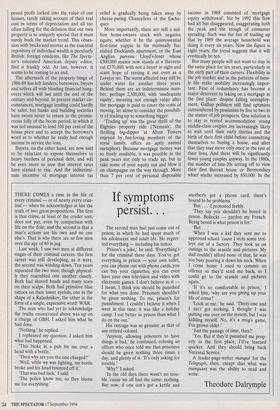If symptoms
persist. . .
THERE COMES a time in the life of every criminal — or of nearly every crim- inal — when he acknowledges at last the truth of two great propositions. The first is that crime, at least of the cruder sort, does not pay, even by comparison with life on the dole; and the second is that a man's actions are his own and no one else's. That is why there are so few men over the age of 40 in jug.
Last week, I saw two men at different stages of their criminal careers: the first career was still developing, as it were, the second was winding down. Ten years separated the two men, though physical- ly they resembled one another closely. Both had shaved heads and many scars • on their scalps. Both had primitive blue tattoos on their lower eyelids, one in the shape of a Kalashnikov, the other in the form of a single, expressive word: WAR.
The man who had yet to acknowledge the truths enumerated above was up on a charge of GBH. I asked him what he had done.
`Nothing,' he replied.
I rephrased my question. I asked him what had happened.
`This bloke in a pub hit me over a head with a bottle.'
`Then why are you the one charged?' `Well, while we was fighting, my bottle broke and his head bounced off it.' `That was bad luck,' I said.
`The police know me, so they blame me for everything.' The second man had just come out of prison, in which he had spent much of his adolescent and adult life. He regret- ted everything — including his tattoo.
`Prison's a joke,' he said. 'Everything's for the criminal these days. You've got everything in prison — your own toilet, you can phone out with phone cards, you can buy your cigarettes, you can even have your own television and video with electronic games. I don't believe in it I mean, I think you should be punished for what you done. Prisoners shouldn't be given nothing. To me, prison's for punishment. I couldn't believe it when I went in this time: it was like a holiday camp. I eat better in prison than what I do on the out.'
His outrage was as genuine as that of any retired colonel.
`Anyway, allowing prisoners to have things is bad,' he continued, echoing an officer who once told me that prisoners should be given nothing three times a day, and plenty of it. 'It's only asking for trouble.'
`Why?' I asked.
`In the old days there wasn't no trou- ble 'cause we all had the same: nothing. But now, if one con's got a kettle and another's got a phone card, there's bound to be problems.'
`But . . I protested feebly.
`They say you shouldn't be bored in prison. Bollocks — pardon my French. Being bored is what prison is for.'
`But . .
`When I was a kid they sent me to approved school 'cause I stole some trol- leys out of a factory. They took us on outings to the seaside and pictures. My dad couldn't afford none of that, he was too busy pouring it down his neck. When I come home I used to commit an offence so they'd send me back, so I could go to the seaside and pictures again.'
`If it's so comfortable in prison,' I asked him, 'why are you giving up your life of crime?'
`Look at me,' he said. 'Thirty-one and I ain't got nothing. I thought I was putting one over on the system, but I was kidding myself. No, it's a mug's game, I've grown older.'
`Just the passage of time, then?'
`Yes. But if they'd punished me prop- erly in the first place, I'd've learned quicker. And they should bring back National Service.'
A leader-page-writer manque for the Telegraph, then, except that what was manquant was the ability to read and write.
Theodore Dalrymple


























































 Previous page
Previous page